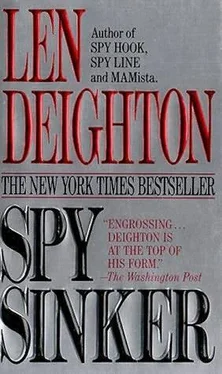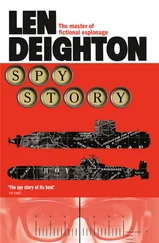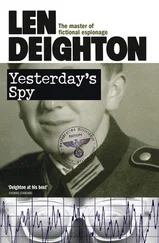Len Deighton - Spy Sinker
Здесь есть возможность читать онлайн «Len Deighton - Spy Sinker» — ознакомительный отрывок электронной книги совершенно бесплатно, а после прочтения отрывка купить полную версию. В некоторых случаях можно слушать аудио, скачать через торрент в формате fb2 и присутствует краткое содержание. Жанр: Триллер, на английском языке. Описание произведения, (предисловие) а так же отзывы посетителей доступны на портале библиотеки ЛибКат.
- Название:Spy Sinker
- Автор:
- Жанр:
- Год:неизвестен
- ISBN:нет данных
- Рейтинг книги:4 / 5. Голосов: 1
-
Избранное:Добавить в избранное
- Отзывы:
-
Ваша оценка:
- 80
- 1
- 2
- 3
- 4
- 5
Spy Sinker: краткое содержание, описание и аннотация
Предлагаем к чтению аннотацию, описание, краткое содержание или предисловие (зависит от того, что написал сам автор книги «Spy Sinker»). Если вы не нашли необходимую информацию о книге — напишите в комментариях, мы постараемся отыскать её.
Spy Sinker — читать онлайн ознакомительный отрывок
Ниже представлен текст книги, разбитый по страницам. Система сохранения места последней прочитанной страницы, позволяет с удобством читать онлайн бесплатно книгу «Spy Sinker», без необходимости каждый раз заново искать на чём Вы остановились. Поставьте закладку, и сможете в любой момент перейти на страницу, на которой закончили чтение.
Интервал:
Закладка:
'Not if we can avoid it,' said Fiona. 'But surely, Herr Renn, you understand my hesitation.'
'You will go?' said Renn.
'I don't think so,' said Fiona. She wanted to go; a trip to the West – just to breathe the air for twenty-four hours – would give her a new lease of life.
'If it's the risk of arrest, I can arrange for you to travel on diplomatic papers.'
'No.'
'Who else is there?'
She looked at him. She'd thought about it and been tempted, but now that Renn asked the direct question she had no answer ready. 'I would have to clear it with Normannenstrasse. They would have to know.'
Renn picked up a plastic box of floppy disks that was on Fiona's desk waiting for the messenger and toyed with it. 'I really would advise against that, Frau Direktor,' said Renn, his eyes averted and his face red with the embarrassment of such direct rebellion.
'Checking with them,' explained Fiona. Technically we all come under their orders.'
'Frau Direktor, to seek instruction from Normannenstrasse, and on a matter which is entirely operational, would be creating a very important precedent. A dangerous precedent.' He shook the box of floppy disks: it rattled. 'Whatever happens in the career of Colonel Moskvin and Major Stinnes this department will I hope continue to function in the way it has done for twelve years or more. But if you ask Normannenstrasse to give you permission for something as normal as the trip to Holland, you'll be virtually putting us under their authority. What would happen in the future? No one here will enjoy anything like independence in any of the work we do. We might as well talk of closing the unit down and going to work in Normannenstrasse.'
She took the box of disks from his fingers and put it back on her desk. Then she looked down at her notepad as if returning to her work. 'I wouldn't want to do that, Herr Renn. You've already told me how much you hate that mad scramble for the Magdalenenstrasse U-Bahn.'
Hubert Renn stiffened and his lips were compressed. By now Fiona should have learned that the sort of joshing that is a normal part of the conversational exchanges in British or American offices did not go down well in Germany. 'But, Frau Direktor…'
'Just a joke, a silly joke,' said Fiona. 'I will of course do exactly as you advise, Herr Renn.'
I'll prepare your papers?'
'Yes, I'll go.' She watched him as he collected together the work he'd done. Hubert Renn was, despite his protestations to the contrary, a complex personality. She'd not yet got over the way in which he was able to reconcile his anti-Russian prejudices with his uncritical dedication to Marx and all his works.
Was Renn's advice – to assume authority beyond what was really hers and use it to make the journey abroad – the bait in some new and nasty trap that her enemies were setting for her? She thought not but she couldn't be sure. Careful, Stefan! No one could be quite sure of anything over here. That was the most important thing she'd learned.
She stood up. 'And there remains the matter of the doctor at the Charité Hospital?'
'Yes, Frau Direktor. These things always take a long time. There is a note on your desk.'
'The note says only that it was all in order.'
Renn came to her side and said, 'Yes, good news, Frau Direktor. Herr Doktor Kennedy is completely clear. Even more than clear: a fellow-traveller. We have used him for some minor tasks in London. He would probably have been used for more important work, except that he'd joined the party when he was a medical student.'
Fiona felt ill. She sat down in her chair again. For a moment she couldn't get her breath. Then she was able to mutter, 'The Communist Party?' Thank God she'd never confided in Kennedy; more than once she'd felt like doing so. He seemed such a dedicated capitalist with his airplane sales and deliveries, but that of course would be a good cover and, as she knew from her day-to-day work, the KGB financed thousands of such businesses to provide cover for agents.
'Yes. What a shame that no one saw his potential and warned him from doing that. Party members cannot, of course, be used for important tasks.'
'Any dates?'
'Nothing since July 1978. Mind you, we have both seen recently how slack the clerks can be when filing the amendments.'
Her head began to throb and she felt sick. 'What did he do for us?'
'Details of that sort are not entered on our files. London Residency would have filed that directly to Moscow. I would guess it to have been surveillance or providing accommodation or arranging references: that's the sort of job such men are used for.'
So that was it: July 1978, a month before the 'accidental' meeting on Waterloo Station. She'd warned Martin off and so Moscow had simply found another way to monitor her. Yes, that would be time enough for Harry to be briefed and prepared. So Harry Kennedy had been assigned by Moscow to check up on her. Was that to be his role in Berlin too? 'Nothing since 1978?'
'Shall I ask Moscow if he is still under instructions?'
'No, Herr Renn, I don't think that would be wise.'
He looked at her and saw that she was not feeling well. 'Whatever you say, Frau Direktor.' He picked up some papers and tactfully left the room.
She swallowed three aspirin tablets: she had packets of them everywhere but they seldom did more than reduce the intensity of the pain. She held her hands over her eyes. By concentrating her mind upon old memories she could sometimes get over these attacks by willpower alone. Pictures of her husband and children flickered in the mind's eye, as blurred and jerky as old film clips. For a long time she sat very still, as someone might recompose themself after stepping out of a wrecked car unscratched.
21
Berlin. March 1984.
The Director-General – restless and demanding – was on one of his unofficial flying visits to Berlin. Frank Harrington, Berlin supremo, cursed at having his daily schedule turned upside-down at short notice, but the old man was like that. He'd always been like that and lately he was getting worse. Not only did he have sudden inconvenient inspirations that everyone was expected to adapt to without question, but Sir Henry was a terrible time-waster. Ensconced in the most comfortable armchair, with a glass of vintage Hine in his hand, Sir Henry Clevemore would talk and talk, periodically interjecting that he must depart as if he was being detained against his will.
That's how it had been that afternoon. The message from the D-G's office had requested 'a German lunch'. Tarrant, the old valet who had been with Frank longer than anyone could remember, arranged everything. They ate in the dining room of the lovely old Grunewald mansion that came with the job of Berlin resident. Frank's cook did a Hasenpfeffer that had become renowned over the years, and the maid wore her best starched apron and even a lace hat. The old silver cutlery was polished and out came the antique Meissen china; the table had looked quite extraordinary. The D-G had remarked on it in Tarrant's hearing: Tarrant had permitted himself a smug little grin.
After lunch the two men had gone into the drawing room for coffee. That was hours ago, and still the D-G showed no signs of departing. Frank wished he'd asked about the return flight, but to do so now would seem impolite. So he nodded at the old man and listened and desperately wanted to light up his pipe. The old man hated pipe tobacco – particularly the brand which Frank smoked – and Frank knew it was out of the question.
'Well, I must be going,' said the D-G, as he'd said it so many times that afternoon, but this time he actually showed signs of moving. Thank goodness, thought Frank. If he could get rid of the old man by seven he'd still be in time for an evening of bridge with his army chums. 'Yes,' said the D-G, looking at his watch, 'I really must be getting along.'
Читать дальшеИнтервал:
Закладка:
Похожие книги на «Spy Sinker»
Представляем Вашему вниманию похожие книги на «Spy Sinker» списком для выбора. Мы отобрали схожую по названию и смыслу литературу в надежде предоставить читателям больше вариантов отыскать новые, интересные, ещё непрочитанные произведения.
Обсуждение, отзывы о книге «Spy Sinker» и просто собственные мнения читателей. Оставьте ваши комментарии, напишите, что Вы думаете о произведении, его смысле или главных героях. Укажите что конкретно понравилось, а что нет, и почему Вы так считаете.












